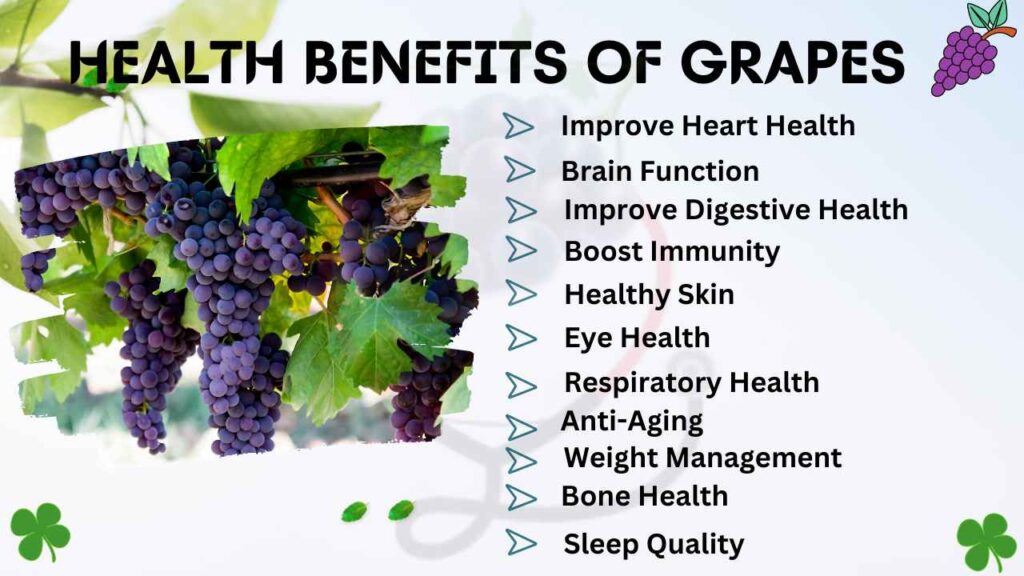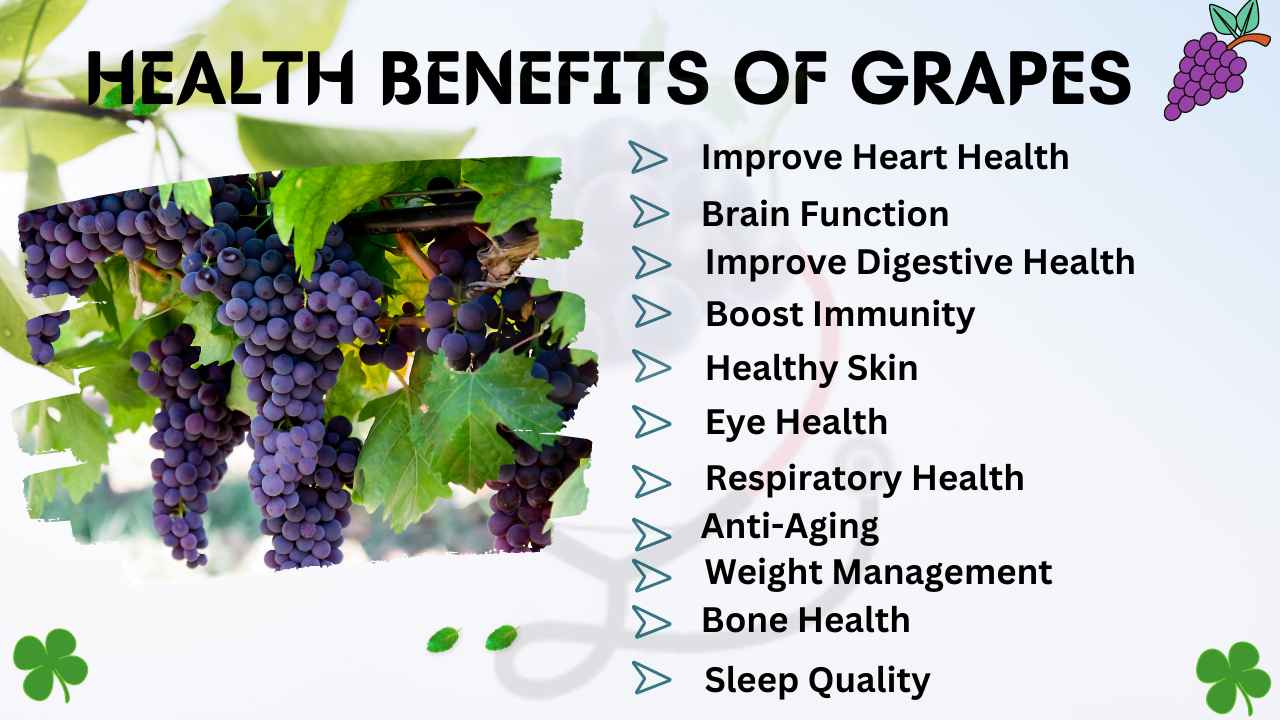Grapes are not only delicious but also offer numerous health benefits. These small, juicy fruits are packed with essential nutrients that can contribute to your overall well-being. [1]
From promoting heart health to improving digestion, grapes have a wide range of positive effects on the body.
In this article, we will explore the various health benefits of grapes and how they can enhance your quality of life.

Contents
- 1 Health Benefits of Grapes
- 1.1 1: Improve Heart Health
- 1.2 2: Boost Testosterone Levels
- 1.3 3: Enhance Brain Function
- 1.4 4: Improve Digestive Health
- 1.5 5: Prevent Prostate Cancer
- 1.6 6: Boost Immunity
- 1.7 7: Reduces high cholesterol
- 1.8 8: Improve Sexual Function
- 1.9 9: Anti-Inflammatory
- 1.10 10: Healthy Skin
- 1.11 11: Improved Eye Health
- 1.12 12: Respiratory Health
- 1.13 13: Anti-Aging Effects of Grapes
- 1.14 14: Weight Management
- 1.15 15: Bone Health
- 1.16 16: Sleep Quality
- 1.17 17: Pregnancy and Fertility
- 1.18 18: Lowers blood pressure
- 1.19 19: May protect against bacteria and fungi
- 1.20 20: Protects against diabetes
- 1.21 21: May improve memory, attention, and mood
- 1.22 22: Keeps You Hydrated
- 1.23 23. May relive constipation
Health Benefits of Grapes

1: Improve Heart Health
Grapes contain compounds that can help improve heart health and prevent heart disease.
Resveratrol, a compound found in grapes, has been shown to reduce inflammation and lower blood pressure, which are both risk factors for heart disease. [2]
Grapes also contain potassium, which can help lower blood pressure and improve heart function.
2: Boost Testosterone Levels
Testosterone is a hormone that is important for men’s health, including maintaining muscle mass, bone density, and sexual function. [3]
Grapes contain compounds that can help boost testosterone levels.
3: Enhance Brain Function
As men age, cognitive decline becomes a concern. Grapes contain compounds that can help enhance brain function and prevent cognitive decline. [4] Resveratrol has been shown to improve memory and learning in animal studies. Grapes also contain antioxidants that can help protect the brain from oxidative stress, which is linked to cognitive decline.
4: Improve Digestive Health
Digestive issues are common among men, and grapes can help improve digestive health. Grapes are high in fiber, which can help regulate bowel movements and prevent constipation.
Grapes also contain compounds that can help protect the gut lining and prevent inflammation, which can improve digestive health. [5]
5: Prevent Prostate Cancer
Prostate cancer is the second most common cancer among men worldwide. Red Grapes contain compounds that can help prevent prostate cancer.[6] Resveratrol has been shown to inhibit the growth of prostate cancer cells in animal studies.
Additionally, grapes contain quercetin, a flavonoid that has been linked to a reduced risk of prostate cancer.
6: Boost Immunity
Men are often more susceptible to infections and diseases than women. Grapes contain compounds that can help boost immunity and prevent infections. [7] Grapes are high in vitamin C, which is important for immune function.
Grapes also contain polyphenols, which have been shown to have antimicrobial properties.
7: Reduces high cholesterol
Grapes contain pectin, a type of fiber that helps to bind to cholesterol in the digestive system and prevent its absorption into the bloodstream. They also contain polyphenols, antioxidants that prevent the oxidation of LDL cholesterol and the formation of plaque in the arteries. [8] Consuming grapes as part of a balanced diet can help to lower cholesterol levels and support heart health.
8: Improve Sexual Function
Sexual dysfunction is a common concern among men, and grapes can help improve sexual function. Grapes contain compounds that can help improve blood flow, which is important for sexual function. [9]
Resveratrol has been shown to improve erectile function in animal studies. Grapes also contain antioxidants that can help protect the reproductive system from oxidative stress.
9: Anti-Inflammatory
Inflammation is a natural response to injury or infection, but chronic inflammation can contribute to a wide range of health problems, including heart disease, diabetes, and cancer. Grapes contain anti-inflammatory compounds that can help reduce inflammation throughout the body.
10: Healthy Skin
Grapes are packed with antioxidants, which can help protect the skin from damage caused by UV radiation and environmental toxins. They also contain vitamin C, which is essential for collagen production and can help keep the skin looking youthful and healthy. [10]
11: Improved Eye Health
Grapes contain compounds called anthocyanins, which can help improve eye health. [11] These compounds can help protect the retina from damage and reduce the risk of age-related eye diseases, such as macular degeneration.
12: Respiratory Health
Grapes can also help improve respiratory health. The antioxidants in grapes can help reduce inflammation in the lungs and improve lung function. They also contain a compound called quercetin, which has been shown to improve the symptoms of asthma. [12]
13: Anti-Aging Effects of Grapes
Grapes are a natural anti-aging food, thanks to their high levels of antioxidants. These compounds can help reduce the damage caused by free radicals and promote healthy aging. The resveratrol in grapes has been shown to activate genes that promote longevity and slow the aging process. [13]
14: Weight Management
Grapes are a great snack for anyone trying to manage their weight. They’re low in calories, high in fiber, and contain compounds that can help reduce inflammation and improve metabolic health. Studies have shown that eating grapes can help promote weight loss and reduce the risk of obesity-related diseases. [14]
15: Bone Health
Grapes contain several nutrients that are essential for bone health, including calcium, magnesium, and vitamin K. These nutrients can help improve bone density and reduce the risk of fractures and osteoporosis. [15]
16: Sleep Quality
Grapes contain a compound called melatonin, which is essential for regulating the sleep-wake cycle. Eating grapes or drinking grape juice can help improve sleep quality and promote restful sleep. [16]
17: Pregnancy and Fertility
Grapes are a great food for pregnant women and those trying to conceive. They contain folate, which is essential for fetal development, as well as antioxidants that can help protect against birth defects. Additionally, the resveratrol in grapes has been shown to improve fertility in both men and women. [17]
18: Lowers blood pressure
Grapes have blood pressure-lowering effects, making them a great addition to a heart-healthy diet. This is because grapes are high in potassium, which is an important mineral that helps to regulate blood pressure. Potassium helps to counteract the effects of sodium, which can raise blood pressure if consumed in excess. [18]
19: May protect against bacteria and fungi
Grapes contain natural compounds that have antimicrobial properties, which mean they may help to protect against harmful bacteria and fungi. One of the compounds found in grapes is called ellagic acid, which has been shown to have antimicrobial effects against several types of bacteria and fungi, including Staphylococcus aureus and Candida albicans. [19]
20: Protects against diabetes
Grapes contain polyphenols that help to improve insulin sensitivity and reduce inflammation, which are important for regulating blood sugar levels and protecting against diabetes and its complications. Consuming grapes as part of a balanced diet may be beneficial for those with or at risk of diabetes. [20]
21: May improve memory, attention, and mood
Grapes contain polyphenols like resveratrol, which protect the brain and improve memory, mood, and attention. Regular consumption boosts cognitive function, reduces anxiety and depression, and enhances driving in older adults. Polyphenols enhance brain blood flow and reduce inflammation for optimal brain health.[21]
22: Keeps You Hydrated
Grapes are an excellent source of water, making them a great way to stay hydrated. In fact, over 70% of a grape’s weight is water, making them a natural source of hydration. [22]
The high water content of grapes can help to promote satiety and reduce overall calorie intake, making them a smart choice for weight management.
23. May relive constipation
Constipation is eased by dietary changes, including increased fiber and fluid intake.[23] Grapes, being rich in fiber and water content, can improve constipation symptoms and help with hydration goals. [24]

